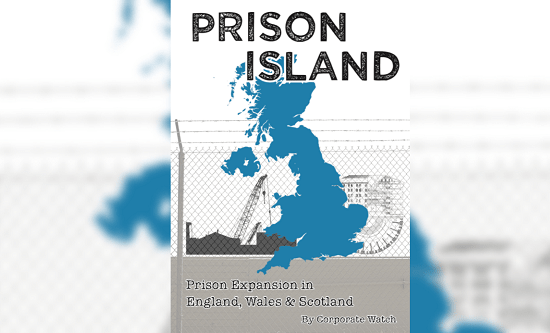
Prison Island – prison expansion in England and Wales, Corporate Watch, 2018 [https://corporatewatch.org/prisonisland/]
‘When the prison doors are opened, the real dragon will fly out.’ – Ho Chi Minh
Prison Island is a valuable educational resource, covering an array of topics like forced labour, the companies lobbying and supporting several planned prison complexes and the misleading nature of state propaganda. While the perspective from which it is presented is one of utopian anarchist abolitionism, the material in the report is of use to all those opposing the capitalist punishment system.
England and Wales have the highest imprisonment rate in Western Europe at 148.3 prisoners per 100,000 people, amounting to 85,000 prisoners currently behind bars in 122 prisons. (This does not include Scotland or the north of Ireland, whose populations are counted separately.) 18% of these prisoners are held in private prisons – a higher percentage than in any other European country or the US.
The Prison Estates Transformation Programme (PETP)
In 2016 the Tory government set out a Prison Estates Transformation Programme (PETP) to create 10,000 new prison places in England and Wales. The PETP included plans to construct or redevelop six prisons for men – at Wellingborough in Northamptonshire, Glen Parva in Leicestershire, Full Sutton in East Yorkshire, Rochester in Kent, Hindley in Wigan, Greater Manchester, and Port Talbot in South Wales – and to build five new ‘community prisons’ for women. It was envisaged that five of the new prisons would be built by 2020; however the building of the ‘women’s community prisons’ was subsequently shelved until further notice due to budget constraints.
The Scottish government is also planning a new men’s prison at HMP Highland and a women’s prison at Corton Vale, as well as considering the future construction of a hotly debated ‘non-binary complex’.
The six primary prison sites planned under PETP are what Corporate Watch describes as ‘mega-prisons’; these carceral cities will each include space ‘to accommodate sizeable prison industries’. The publication goes on to state that ‘the centre-pieces of the new mega-prisons are massive workshops, factories within prison walls… to exploit a growing imprisoned workforce’. Data from the Prison Reform Trust shows an average of 9,400 prisoners already working for external companies in the public prison estate, and a further 1,800 working in private prisons. The creation of an additional 10,000 prison spaces in six specially constructed carceral cities complete with factory-sized means of production means that a larger number of prisoners will be open to capitalist exploitation.
Corporate Watch writes: ‘Prisoner workers have no rights to organise and no minimum wage. No health and safety legislation applies. If they refuse to work, they are punished via the Incentives and Earned Privileges scheme and can have visits, association time (time outside in a courtyard or out of cell) and other “privileges” taken away from them.’ If there were any doubt as to the degree to which prisoners’ labour is exploited, Corporate Watch describes prison workers being paid ‘between £6 and £10 for a five-day working week’.
Whilst Justice Secretary David Gauke claims to be reforming the prison system as part of a strategy for ‘a safer, fairer, more productive Britain’, in reality the intensifying attacks on the working class will ensure that both old and new prisons continue to be part of the machinery of containment and punishment.
As Prison Island details, 26% of the prison population is from minority ethnic groups; 29% of people in prison are identified as having learning difficulties or disabilities and ‘over half of the people entering prison were assessed as having literacy skills expected of an 11-year-old’. With a recorded 345 sexual assaults in 2016, widespread medical neglect, emergency service call-outs topping 26,000 in 2015 and the ‘highest rates of self-harm and assault since records began’, resulting in ‘self-harm every fifteen minutes and attempts [from prisoners] to take their own life around once every four hours’, this ‘brutalising, punitive and dehumanising penal regime’ cannot even attempt the pretence that reform is feasible.
Even the planned massive prison building programme is not going to be sufficient to house the projected number of prisoners. Former finance director of the HM Prison Service Julian Le Vay has said that ‘according to central projections on which the Ministry of Justice plans are based, it would be necessary to start another building programme in 2026, and so to open more new prisons in 2028’.
As the booklet concludes, ‘the threat of prison will continue to influence the desire of populations to resist and fight for systemic change’..
Martyn Franek




